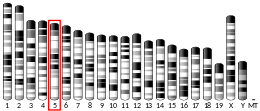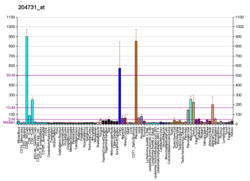TGFBR3
Betaglycan also known as Transforming growth factor beta receptor III (TGFBR3), is a cell-surface chondroitin sulfate / heparan sulfate proteoglycan >300 kDa in molecular weight. Betaglycan binds to various members of the TGF-beta superfamily of ligands via its core protein, and bFGF via its heparan sulfate chains. It is not involved directly in TGF-beta signal transduction but by binding to various member of the TGF-beta superfamily at the cell surface it acts as a reservoir of ligand for TGF-beta receptors.[5][6]
See also
- TGF beta receptors
References
- GRCh38: Ensembl release 89: ENSG00000069702 - Ensembl, May 2017
- GRCm38: Ensembl release 89: ENSMUSG00000029287 - Ensembl, May 2017
- "Human PubMed Reference:". National Center for Biotechnology Information, U.S. National Library of Medicine.
- "Mouse PubMed Reference:". National Center for Biotechnology Information, U.S. National Library of Medicine.
- Andres JL, Stanley K, et al. (1989). "Membrane-anchored and soluble forms of betaglycan, a polymorphic proteoglycan that binds transforming growth factor-beta". J. Cell Biol. 109 (6 (Pt 1)): 3137–3145. doi:10.1083/jcb.109.6.3137. PMC 2115961. PMID 2592419.
- Andres JL, DeFalcis D, et al. (1992). "Binding of two growth factor families to separate domains of the proteoglycan betaglycan". J. Biol. Chem. 267 (9): 5927–5930. PMID 1556106.
Further reading
- Massagué J (1992). "Receptors for the TGF-beta family". Cell. 69 (7): 1067–70. doi:10.1016/0092-8674(92)90627-O. PMID 1319842.
- Border WA, Noble NA (1994). "Transforming growth factor beta in tissue fibrosis". N. Engl. J. Med. 331 (19): 1286–92. doi:10.1056/NEJM199411103311907. PMID 7935686.
- Morén A, Ichijo H, Miyazono K (1992). "Molecular cloning and characterization of the human and porcine transforming growth factor-beta type III receptors". Biochem. Biophys. Res. Commun. 189 (1): 356–62. doi:10.1016/0006-291X(92)91566-9. PMID 1333192.
- López-Casillas F, Cheifetz S, Doody J, et al. (1991). "Structure and expression of the membrane proteoglycan betaglycan, a component of the TGF-beta receptor system". Cell. 67 (4): 785–95. doi:10.1016/0092-8674(91)90073-8. PMID 1657406.
- Wang XF, Lin HY, Ng-Eaton E, et al. (1991). "Expression cloning and characterization of the TGF-beta type III receptor". Cell. 67 (4): 797–805. doi:10.1016/0092-8674(91)90074-9. PMID 1657407.
- Lin HY, Moustakas A, Knaus P, et al. (1995). "The soluble exoplasmic domain of the type II transforming growth factor (TGF)-beta receptor. A heterogeneously glycosylated protein with high affinity and selectivity for TGF-beta ligands". J. Biol. Chem. 270 (6): 2747–54. doi:10.1074/jbc.270.6.2747. PMID 7852346.
- López-Casillas F, Payne HM, Andres JL, Massagué J (1994). "Betaglycan can act as a dual modulator of TGF-beta access to signaling receptors: mapping of ligand binding and GAG attachment sites". J. Cell Biol. 124 (4): 557–68. doi:10.1083/jcb.124.4.557. PMC 2119924. PMID 8106553.
- Maruyama K, Sugano S (1994). "Oligo-capping: a simple method to replace the cap structure of eukaryotic mRNAs with oligoribonucleotides". Gene. 138 (1–2): 171–4. doi:10.1016/0378-1119(94)90802-8. PMID 8125298.
- Johnson DW, Qumsiyeh M, Benkhalifa M, Marchuk DA (1996). "Assignment of human transforming growth factor-beta type I and type III receptor genes (TGFBR1 and TGFBR3) to 9q33-q34 and 1p32-p33, respectively". Genomics. 28 (2): 356–7. doi:10.1006/geno.1995.1157. PMID 8530052.
- Suzuki Y, Yoshitomo-Nakagawa K, Maruyama K, et al. (1997). "Construction and characterization of a full length-enriched and a 5'-end-enriched cDNA library". Gene. 200 (1–2): 149–56. doi:10.1016/S0378-1119(97)00411-3. PMID 9373149.
- Brown CB, Boyer AS, Runyan RB, Barnett JV (1999). "Requirement of type III TGF-beta receptor for endocardial cell transformation in the heart". Science. 283 (5410): 2080–2. doi:10.1126/science.283.5410.2080. PMID 10092230.
- Gao J, Symons AL, Bartold PM (1999). "Expression of transforming growth factor-beta receptors types II and III within various cells in the rat periodontium". J. Periodont. Res. 34 (2): 113–22. doi:10.1111/j.1600-0765.1999.tb02230.x. PMID 10207840.
- Lewis KA, Gray PC, Blount AL, et al. (2000). "Betaglycan binds inhibin and can mediate functional antagonism of activin signalling". Nature. 404 (6776): 411–4. doi:10.1038/35006129. PMID 10746731.
- Zippert R, Bässler A, Holmer SR, et al. (2000). "Eleven single nucleotide polymorphisms and one triple nucleotide insertion of the human TGF-beta III receptor gene". J. Hum. Genet. 45 (4): 250–3. doi:10.1007/s100380070035. PMID 10944857.
- Rotzer D, Roth M, Lutz M, et al. (2001). "Type III TGF-β receptor-independent signalling of TGF-β2 via TβRII-B, an alternatively spliced TGF-β type II receptor". EMBO J. 20 (3): 480–90. doi:10.1093/emboj/20.3.480. PMC 133482. PMID 11157754.
- Blobe GC, Schiemann WP, Pepin MC, et al. (2001). "Functional roles for the cytoplasmic domain of the type III transforming growth factor beta receptor in regulating transforming growth factor beta signaling". J. Biol. Chem. 276 (27): 24627–37. doi:10.1074/jbc.M100188200. PMID 11323414.
- De Crescenzo G, Grothe S, Zwaagstra J, et al. (2001). "Real-time monitoring of the interactions of transforming growth factor-beta (TGF-beta ) isoforms with latency-associated protein and the ectodomains of the TGF-beta type II and III receptors reveals different kinetic models and stoichiometries of binding". J. Biol. Chem. 276 (32): 29632–43. doi:10.1074/jbc.M009765200. PMID 11382746.
- Blobe GC, Liu X, Fang SJ, et al. (2001). "A novel mechanism for regulating transforming growth factor beta (TGF-beta) signaling. Functional modulation of type III TGF-beta receptor expression through interaction with the PDZ domain protein, GIPC". J. Biol. Chem. 276 (43): 39608–17. doi:10.1074/jbc.M106831200. PMID 11546783.
External links
- betaglycan at the US National Library of Medicine Medical Subject Headings (MeSH)
This article is issued from Wikipedia. The text is licensed under Creative Commons - Attribution - Sharealike. Additional terms may apply for the media files.




